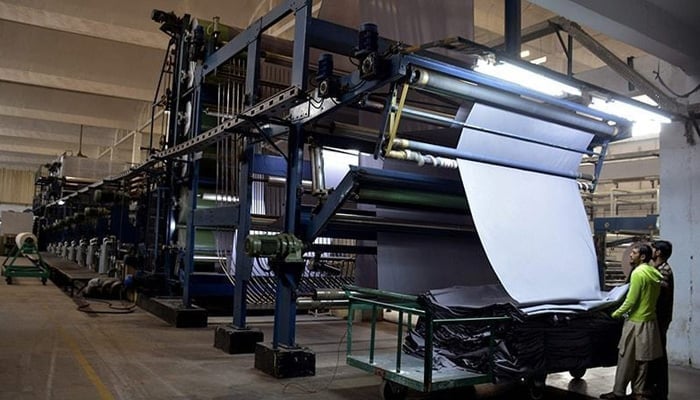Textile sector faces climate, cost challenges, needs renewable energy: experts
Pakistan was the fourth largest exhibitor at Heimtextil 2024, with more than 270 companies showcasing their products
KARACHI: The textile sector, one of the country’s main export earners, needs to switch to renewable energy sources to cut costs and reduce its environmental impact, industry experts said on Tuesday.
They were speaking at a panel discussion organised by the German consulate in Karachi, in collaboration with the Goethe Institut and the German development agency GIZ, to share their experiences of attending Heimtextil, a leading global trade fair for home and contract textiles, held in Frankfurt earlier this year.
Pakistan was the fourth largest exhibitor at Heimtextil 2024, with more than 270 companies showcasing their products and innovations to buyers from around the world. The panelists discussed the importance of renewable energy and innovative technologies for transforming the textile industry, which accounts for about 60 percent of Pakistan’s exports and employs millions of workers. They also highlighted the challenges and opportunities of achieving net zero emissions, phasing out coal and other fossil fuels, and implementing zero liquid discharge (ZLD) systems to treat wastewater.
Zaki Bashir, CEO of Gul Ahmed Textile, one of Pakistan’s largest textile manufacturers, said that using renewable energy sources such as solar and wind was imperative for the sector, as Pakistan was among the 10 most vulnerable countries to climate change.
He said that renewable energy would not only help the industry reduce its carbon footprint, but also lower its energy costs, which are among the highest in the region.
Hassan Tabba, CEO of Yunus Textile Mills, another leading textile exporter, echoed Bashir’s views and said that Pakistan had to exploit its renewable energy potential to stay competitive in the global market.
He said that Pakistan’s textile sector faced stiff competition from countries like Bangladesh, Vietnam and India, which had lower energy tariffs and more favourable trade policies.
Fawad Anwar, CEO of Al Karam Textile, said that Pakistan had started late in adopting renewable energy and needed to catch up with the demands of the sector. He said that the government should provide incentives and support to the textile industry to invest in renewable energy projects and technologies.
Yulia Bazhenova, head of projects at GIZ, said that sustainability in Pakistan’s textile sector could only be achieved through cost-cutting measures and energy efficiency. She said that international regulations and standards also required Pakistan’s textile sector to be more environmentally friendly and socially responsible.
Bazhenova said that GIZ was working with the textile industry to improve its energy management, water conservation and waste reduction practices. Zulfiqar Shah, country manager of Pakistan Accord, a platform of European brands and retailers that promotes fire and building safety in the garment sector, said that the textile industry should also engage with the government and civil society to formulate policies and strategies for renewable energy.
-
 Royal Family's Approach To Deal With Andrew Finally Revealed
Royal Family's Approach To Deal With Andrew Finally Revealed -
 Super Bowl Weekend Deals Blow To 'Melania' Documentary's Box Office
Super Bowl Weekend Deals Blow To 'Melania' Documentary's Box Office -
 Meghan Markle Shares Glitzy Clips From Fifteen Percent Pledge Gala
Meghan Markle Shares Glitzy Clips From Fifteen Percent Pledge Gala -
 Melissa Jon Hart Explains Rare Reason Behind Not Revisting Old Roles
Melissa Jon Hart Explains Rare Reason Behind Not Revisting Old Roles -
 Meghan Markle Eyeing On ‘Queen’ As Ultimate Goal
Meghan Markle Eyeing On ‘Queen’ As Ultimate Goal -
 Japan Elects Takaichi As First Woman Prime Minister After Sweeping Vote
Japan Elects Takaichi As First Woman Prime Minister After Sweeping Vote -
 Kate Middleton Insists She Would Never Undermine Queen Camilla
Kate Middleton Insists She Would Never Undermine Queen Camilla -
 King Charles 'terrified' Andrew's Scandal Will End His Reign
King Charles 'terrified' Andrew's Scandal Will End His Reign -
 Winter Olympics 2026: Lindsey Vonn’s Olympic Comeback Ends In Devastating Downhill Crash
Winter Olympics 2026: Lindsey Vonn’s Olympic Comeback Ends In Devastating Downhill Crash -
 Adrien Brody Opens Up About His Football Fandom Amid '2026 Super Bowl'
Adrien Brody Opens Up About His Football Fandom Amid '2026 Super Bowl' -
 Barbra Streisand's Obsession With Cloning Revealed
Barbra Streisand's Obsession With Cloning Revealed -
 What Did Olivia Colman Tell Her Husband About Her Gender?
What Did Olivia Colman Tell Her Husband About Her Gender? -
 'We Were Deceived': Noam Chomsky's Wife Regrets Epstein Association
'We Were Deceived': Noam Chomsky's Wife Regrets Epstein Association -
 Patriots' WAGs Slam Cardi B Amid Plans For Super Bowl Party: She Is 'attention-seeker'
Patriots' WAGs Slam Cardi B Amid Plans For Super Bowl Party: She Is 'attention-seeker' -
 Martha Stewart On Surviving Rigorous Times Amid Upcoming Memoir Release
Martha Stewart On Surviving Rigorous Times Amid Upcoming Memoir Release -
 Prince Harry Seen As Crucial To Monarchy’s Future Amid Andrew, Fergie Scandal
Prince Harry Seen As Crucial To Monarchy’s Future Amid Andrew, Fergie Scandal




